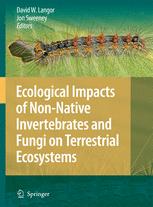

Most ebook files are in PDF format, so you can easily read them using various software such as Foxit Reader or directly on the Google Chrome browser.
Some ebook files are released by publishers in other formats such as .awz, .mobi, .epub, .fb2, etc. You may need to install specific software to read these formats on mobile/PC, such as Calibre.
Please read the tutorial at this link: https://ebookbell.com/faq
We offer FREE conversion to the popular formats you request; however, this may take some time. Therefore, right after payment, please email us, and we will try to provide the service as quickly as possible.
For some exceptional file formats or broken links (if any), please refrain from opening any disputes. Instead, email us first, and we will try to assist within a maximum of 6 hours.
EbookBell Team

4.4
72 reviewsSince the arrival of Europeans about 500 years ago, an estimated 50,000 non-native species have been introduced to North America (including Hawaii). Non-native species figure prominently in our lives, often as ornamentals, sources of food or pests. Although many introduced species are beneficial, there is increasing awareness of the enormous economic costs associated with non-native pests. In contrast, the ecological impacts of non-native species have received much less public and scientific attention, despite the fact that invasion by exotic species ranks second to habitat destruction as a cause of species loss. In particular, there is little information about the ecological impacts of hyper-diverse groups such as terrestrial fungi and invertebrates. A science symposium, Ecological impacts of non-native invertebrates and fungi on terrestrial ecosystems, held in 2006, brought together scientists from the USA and Canada to review the state of knowledge in this field of work. Additional reviews were solicited following the symposium. The resulting set of review/synthesis papers and case studies represents a cross-section of work on ecological impacts of non-native terrestrial invertebrates and fungi. Although there is a strong focus on Canadian work, there is also significant presentation of work in the northern USA and Europe.